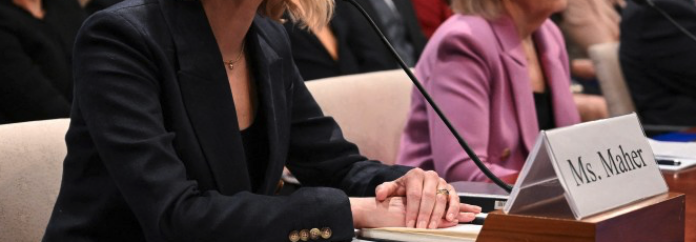Well, it looks like Katherine Maher didn’t expect to be held accountable for her Greatest Twitter Hits when she sat down in front of Congress this week. Unfortunately for her, Rep. Brandon Gill (R-TX) came with receipts, and what followed was one of those painfully awkward exchanges that would’ve been funny if it weren’t so revealing about the ideological rot sitting at the top of our taxpayer-funded media institutions.
Maher, NPR’s recently minted CEO, walked into that hearing as the face of so-called “objective” journalism. But what we saw on display wasn’t the even-keeled stewardship of a public media executive. It was a woke ideologue squirming under the weight of her own digital paper trail. And let’s just say — she was not ready for it.
Let’s start with the obvious: the tweets. Oh, the tweets. In one breath, Maher waxed poetic about taking a day off to read The Case for Reparations by Ta-Nehisi Coates. In the next, she claimed she couldn’t even recall having done it. Gill reminded her that she herself had tweeted about it in 2020. Her response? “I don’t recall that I did.” That’s a bold move — forgetting the book you took a day off to read and publicly announced reading — especially when it just happens to be one of the most racially divisive essays of the last decade.
Hope you had a nice day off, @krmaher! pic.twitter.com/auf7eZuEXA
— Congressman Brandon Gill (@RepBrandonGill) March 27, 2025
But the hits kept coming. Maher was forced to acknowledge she tweeted that “America is addicted to white supremacy” — a claim that would get a college freshman praised in a DEI seminar but lands a bit differently when it’s coming from the head of an organization that gets $30 million a year from U.S. taxpayers. You know, the same taxpayers she seems to believe are upholding some monolithic racial hierarchy with their very existence. When asked about that tweet, she mumbled something about how her thinking has “evolved.” Sure. Evolved. Or maybe just sanitized now that there’s an oversight committee watching.
No more money for NPR. https://t.co/TGTQZgadWA
— Cernovich (@Cernovich) March 26, 2025
It got even more tone-deaf from there. Maher had previously tweeted, “How white of me,” and wrote a love letter to reparations that included a string of “yes” statements you’d expect from someone workshopping a spoken-word piece, not the CEO of a major media outlet. Asked whether she still supports reparations, she denied meaning it in a “fiscal” sense and tried to rebrand the tweet as some vague philosophical ode to “those who came before us.” Nice try. But when you explicitly say “yes, reparations” in a tweet, you don’t get to retroactively slap an asterisk on it and pretend you meant something else.
And then came the real kicker — Maher’s response to looting during the 2020 protests. When asked about her old tweet claiming it was “hard to be mad about protests not prioritizing private property,” she tried to walk it back by calling looting merely “counterproductive.” It took Gill pressing her repeatedly before she finally managed to say looting is, in fact, “morally wrong.” Imagine needing a congressional hearing to coax that out of the head of America’s “most trusted” public broadcaster.
Maher’s performance didn’t just raise eyebrows — it raised serious questions about whether NPR can still call itself a neutral, balanced outlet when its leadership is steeped in this kind of racial grievance ideology. Taxpayers don’t fork over tens of millions of dollars each year to be condescended to by someone who once tweeted that she “grew up feeling superior” — followed by the smug sign-off, “How white of me.” You can’t simultaneously claim to run a fair, balanced newsroom and also think the entire country is hopelessly racist, built on a foundation of sin, and in need of some metaphysical reckoning through reparations.
The media wants to pretend this is no big deal. That Maher’s tweets are ancient history or “taken out of context.” But they’re not. They’re part of a pattern — a mindset — that has bled into mainstream journalism and made objectivity a quaint relic. Maher may now wear the suit and sit behind the boardroom desk, but she’s still carrying the torch for the same ideology that’s driving trust in public institutions into the ground.
The crazy lady was NOT READY for this!
— Cernovich (@Cernovich) March 26, 2025
The only thing more shocking than her inability to defend her own words is that someone thought this was the best person to run a federally funded news outlet. If Maher’s testimony showed us anything, it’s that NPR doesn’t need a new communications strategy — it needs new leadership, and maybe a long, hard look in the mirror.







